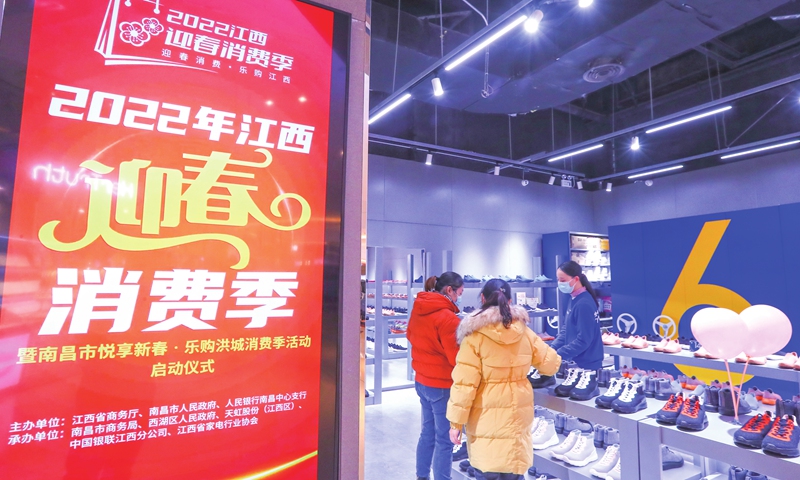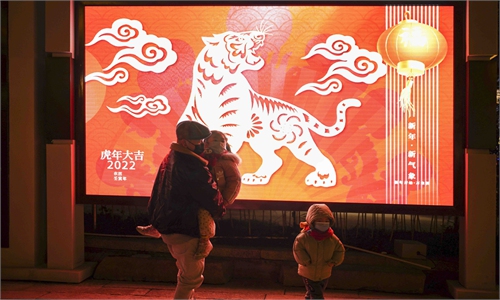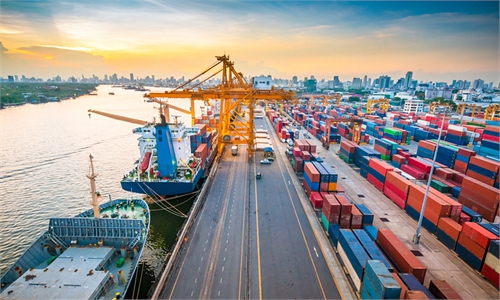China’s top economic planner to boost holiday consumption amid COVID flare-ups
Efforts to expand consumption amid new COVID-19 flare-ups

Consumers shop in a department store in Nanchang, East China's Jiangxi Province on December 22, 2021, as the province kicks off a campaign with more than 1,000 promotional activities to spur consumption over the forthcoming holidays, including the New Year's Day holiday and the Spring Festival. Photo: cnsphoto
China's top economic planner vowed on Sunday to boost holiday consumption during the upcoming Chinese New Year, as new COVID-19 flare-ups in several cities, including Omicron infections in Beijing and Tianjin, sparked concerns about holiday spending.
In a statement, the National Development and Reform Commission (NDRC) outlined measures to expand consumption - a major growth driver that's been slow to recover but has great potential to be unleashed - in an effort to boost the economy in the first quarter of the year.
Under the premise of accurate and effective epidemic prevention and control, the NDRC suggested seizing the opportunities of the traditional shopping season of the Spring Festival and Lantern Festival, and adjusting to people's changing habits and demand for better product quality, to unleash consumption potential and get first-quarter economic conditions off to a smooth start.
Online shopping, snow-related consumption, the sound development of housing consumption, and support for micro-sized, small and medium-sized enterprises are being encouraged by the NDRC.
While some cities in China have urged people to stay put during the holidays to stem the spread of the COVID-19, the NDRC said consumption should be stabilized and expanded under normal virus control measures and "the impact on production and life should be minimized."
"Consumption during the Spring Festival season will be hot. Even if stay-put policies affect cross-provincial travel and the aviation and accommodation sectors, spending in first-tier cities will be lively compared with rural areas," Zhao Ping, deputy head of the Academy of China Council for the Promotion of International Trade, told the Global Times on Sunday, saying that this is the "new post-pandemic normal."
Sales and revenue from key retailers and restaurants hit 821 billion yuan ($129.24 billion) during the Spring Festival holidays in 2021, up 28.7 percent from 2020 and up 4.9 percent from the pre-coronavirus level in 2019, official statistics showed.
Consumption during the holiday season depends on people's expectations for their income, Zhao said, as China's economy continues gain momentum, this year's results during the Spring Festival will grow from 2021's levels.
A white-collar worker surnamed Wang will have to stay in Beijing during the holidays as her hometown - Tianjin - is combating a new COVID-19 flare-up, but that won't change spending habits.
"I will spend money on food and films during the holiday season… and there will be many blockbusters. As film tickets cost a lot, I believe the box office will be outstanding," Wang told the Global Times.
The NDRC's statement was issued before the Monday kick-off of the country's 40-day Spring Festival travel, or chunyun, the world's largest human migration, with 1.18 billion trips expected to occur, according to the estimate of the Ministry of Transport. That means about 29.5 million trips each day.
Based on the prediction, it will mean a rise of 35.6 percent compared with 2021 (870 million), but a fall from the 2020 level (1.48 billion).
Even if passenger travel faces uncertainties under the anti-epidemic efforts, ticket pre-sales show that travel demand of students, migrant workers and relatives in general remains at a certain scale, China Railway said in a statement sent to the Global Times on Sunday.
Yao Linxiang, a book editor based in Beijing, told the Global Times that it is easier to buy a train ticket this year back to her hometown in Yichang, Central China's Hubei Province. "Some cities suggest stay put during the holiday season so I found it easier to get a ticket. Before the coronavirus outbreak, I had to buy tickets from scalpers," she said.
More than 10.5 million train seats will be provided each day during the Spring Festival travel rush, up over 10 percent compared with 2019, China Railway said. "If an outbreak occurs, we'll adjust our services, and trains to the region will be reduced or shut down," it said.
A total of 40 pairs of trains will be specially operated for the Beijing 2022 Olympic and Paralympic Winter Games, which kick off in February.
The NDRC is also looking forward to the potential in winter sports and snow-related tourism consumption during the holiday season.
According to China's online travel agency Trip.com, ski resort ticket bookings rose six-fold from December 21, 2021 to January 1, 2022 and millennials were the driving force.
Zhao said the upcoming Beijing Winter Games will attract many viewers, and that may contribute to the broadcasting and subscriptions for online viewing.




